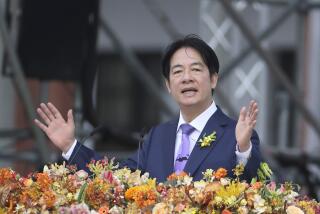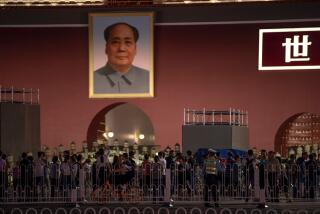CHINA IN TURMOIL : Foreigners, Urged to Evacuate, Flee Beijing
- Share via
BEIJING — Foreigners streamed out of Beijing by air Tuesday as their embassies urged them to leave before the violence gets worse.
Some embassies arranged for special flights out of the capital. Others, including the U.S. Embassy, sent messages to their nationals suggesting strongly that they flee.
“You should leave Beijing,” a caller from the U.S. Embassy told one American resident of the capital. “If you must stay, then go to hotels on the east side of the city.”
An estimated 2,500 Americans live in Beijing. Students residing at universities were evacuated from campuses Monday.
A source close to the U.S. Embassy said the embassy had alerted the Defense Department in Washington to have military planes ready for possible evacuation of U.S. personnel and equipment. In addition, the source said, two United Airlines 747s are on standby in Tokyo for possible emergency flights from Beijing.
An official of the British Embassy said: “Earlier, we advised our citizens to keep their heads down. Now basically we say ‘Go.’ ”
Two American companies with extensive operations in China complied. McDonnell Douglas Corp. in St. Louis ordered 40 U.S. citizens employed at a plant in Shanghai to move to Hong Kong, said spokesman Jim Reed. McDonnell Douglas has a co-production agreement with the Chinese to produce MD-80 commercial aircraft in Shanghai.
Officials at Chrysler, which has one of the largest business operations in China of any American corporation, said in Detroit that the auto maker also has evacuated its eight American personnel and their four dependents from Beijing. They said the American managers of the firm’s Jeep-making joint venture with the Chinese government, located in the southeastern section of Beijing, left the country on a commercial flight Monday morning for Tokyo.
A handwritten message on the door of the British Embassy warned: “Do not go on balconies, look out windows or take photographs of troops. They have warned they will shoot. They mean it.”
The British advised travelers and foreign residents to leave not only Beijing but any place where there has been trouble. Violence has been reported in several Chinese cities, including Shanghai, Wuhan and Shenyang. A hotel was reportedly burned down in Chengdu, in Sichuan province.
Canada reduced its embassy staff in Beijing to 15 from 40. West Germany sent dependents of its embassy staff out of the country. Irish diplomats invited their citizens to take up residence on the Irish embassy grounds. Australia also put up residents at its embassy.
Foreign families hastily packed their bags at walled residence compounds in eastern Beijing. Some drove to the airport or hotels in convoy. By nightfall, the extensive high-rise apartment neighborhoods in Jianguomenwai and Qijiayuan were mostly dark, indicating that many apartments were empty.
Foreigners living in the two compounds had grown increasingly nervous in recent days because of the presence of 20 tanks positioned on a nearby highway intersection. There were reports of army infighting west of the capital, and the fear grew Tuesday that a battle might break out right next to the residential area, which is also where many foreign embassies are located.
To reach the airport, those leaving from downtown Beijing had to find their way through a series of barricades set up across two of the main north-south roads through the city. Cars veered up and down curbs, into bicycle lanes and through narrow side streets to circumvent the barricades.
Many cab drivers refused to make the trip.
“Too dangerous,” explained one.
“Too much shooting,” said another, making a hand signal for a gun.
However, there was no gunfire along the airport route.
Those drivers willing to make the journey asked relatively large sums of money, 100 yuan (about $27) and up.
The airport was pandemonium, even by Beijing standards. In mid-afternoon, at least 2,000 people crowded into the international terminal waiting for flights, getting their names on standby lists and buying or begging tickets. Large groups of Japanese students slept on the floors in front of the All Nippon Airways and Japan Air Lines counters. Some at the airport wept in frustration at their inability to get tickets, and others wept in relief in escaping downtown Beijing.
Many of those at the airport have left hurriedly and with little sleep.
Sleeping on Floor
Chris Davies, a student at Beijing Teachers’ University, had spent Monday night sleeping on the floor of the Canadian Embassy after being evacuated from his school. He was leaving China in such haste that some of his clothes and belongings were still back in his room at the school.
“After what I saw, I didn’t want to stay,” he explained, referring to last weekend’s shootings.
In Hong Kong, the British colonial government announced Tuesday afternoon that it would add three extra flights to the Beijing-Hong Kong route over the next 24 hours to ferry people from the Chinese capital. The first government charter returned from Beijing shortly after midnight Tuesday morning with 128 people on board.
In addition, several other airlines had plans to bring in planes for evacuation of their countries’ nationals--among them Qantas for Australians, Lufthansa for West Germans and British Airways for British citizens.
The Hong Kong government also said it is operating a “hot line,” taking calls from residents who have friends or relatives stranded in Beijing. The list of names is being provided to the British Embassy in Beijing, which is attempting to contact the people, a news release said.
Boarding one flight from Beijing, a Hong Kong businessman sighed deeply and began asking about dinner.
“I spent two days trapped at the Minzu Hotel (located near Tian An Men Square), with no food, no rice, no nothing,” he said.
On the plane, Hong Kong newspapers such as the English-language South China Morning Post were handed out. They reduced the tumult of the previous few days to the comfortable, remote world of newsprint.
Among the journalists on the flight was Willie Lop Lam, the Post’s Beijing correspondent, whose reports over the past few weeks have recounted some of the secret deliberations and maneuvering within the Chinese Communist Party. He said he wanted to wait in Hong Kong at least for a few days before working again in Beijing.
Timothy L. Hooper, the chief China representative for Standard Chartered Bank, which has five branches and four representative offices in China, was one of the businessmen on the flight.
“We were quite prepared to stay,” said Hooper, who also served as treasurer of the British Chamber of Commerce in Beijing. “But we got rung up by the British Embassy Monday night saying your dependents should leave, and they called this morning (Tuesday) and told everyone to leave.”
Why now? “The military is fighting each other. That’s a sign that civil war is at hand,” said Hooper. “That’s very different from an insurrection, which could be put down by the government. It’s not nice to say, but after putting down an insurrection, you can carry on.”
Near Hooper, a 5-year-old boy named David, the son of a British diplomat, played with a toy as he mulled over the events of the past few days.
“When the war is over, we will return to China,” he declared to anyone who would listen. “And it will be nice and clean.”
Williams reported from Beijing and Mann from Beijing and Hong Kong. Times staff writers Karl Schoenberger, in Hong Kong, and James Risen, in Detroit, also contributed to this story.
RELATED STORY: Business, Page 1
More to Read
Sign up for Essential California
The most important California stories and recommendations in your inbox every morning.
You may occasionally receive promotional content from the Los Angeles Times.













